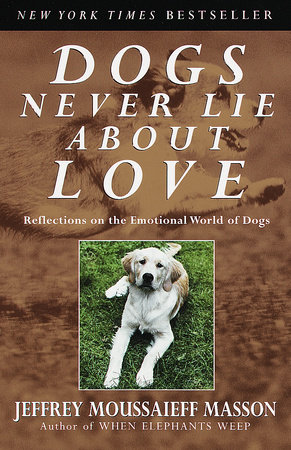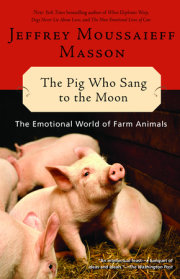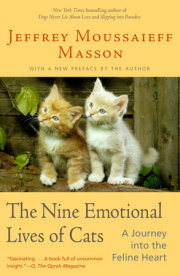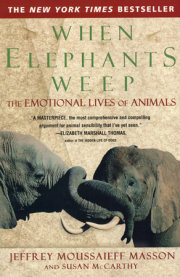Chapter 1Recognizing the Emotions of DogsFew who have lived with dogs would deny that dogs have feelings. Taking a cue from his great friend Darwin, who spoke of conscience in the dog, George Romanes wrote that the emotional life of the dog is highly developed--more highly, indeed, than that of any other animal. (He did not include the human animal, though perhaps he should have done so.) Of course dogs have feelings, and we have no trouble acknowledging most of them. Joy, for example. Can anything be as joyous as a dog? Bounding ahead, crashing into the bushes while out on a walk, happy, happy, happy. Conversely, can anything be as disappointed as a dog when you say, No, we are not going for a walk? Down he flops onto the floor, his ears fall, he looks up, showing the whites of his eyes, with a look of utter dejection. Pure joy, pure disappointment.
But are this joy and disappointment identical to what humans mean when we use these words? What dogs do, the way they behave, even the sounds they make, seem instantaneously translatable into human emotional terms. When a dog is rolling in fresh-cut grass, the pleasure on her face is unmistakable. No one could be wrong in saying that what she is feeling is akin to what any of us (though less often, perhaps) may feel. The words used to describe the emotion may be wrong, our vocabulary imprecise, the analogy imperfect, but there is also some deep similarity that escapes nobody. My dog may appear to feel joy and sorrow much the way I do, and the appearance here is critical: We often have no more to go on when it comes to our fellow humans.
All dog caretakers (just another word for companion and friend) have marveled at the exuberant greeting their dogs give them after a brief absence. Sasha twirls around in delight, squealing and making extraordinary sounds. What accounts for this display of unbounded pleasure in our return? We tend to explain it by assuming a kind of stupidity: The dog thought I was gone forever. Dogs, we say, have no sense of time. As Robert Kirk of the Cornell Veterinary School once put it to me, dogs don't watch the clock. Every minute is forever. Everything is for good. Out means gone. In other words, when dogs do not behave as we do, we assume it to be irrational behavior. Yet a lover is entranced to see the beloved again after even a brief absence and dogs are all about love. (For a fuller discussion on dogs and love, see Chapter 3.)
Another explanation for dogs delight in our return may be found in the way in which puppies greet their mother. As soon as the mother appears, the puppies crowd around her, eager to nurse or expecting her to vomit food for them. Wolves have a greeting ceremony during which they wag their tales, lick one another, and bite the muzzles of other wolves. The pleasure of the puppies may be a vestige of this ceremony, as John Paul Scott and J. L. Fuller suggest.
Soon after she joined the family, Sasha was sitting next to me one evening as I worked on an early draft of this chapter. I had been alone all day, working. There were just the two of us sitting in the living room, and it was very quiet. I looked over at Sasha and noticed that she was looking at me. Suddenly I was overwhelmed with the thought: There is another being in this room, another consciousness. There is somebody here besides me. What, though, was Sasha thinking? Why did she suddenly glance up at me? Was she just checking to make sure I was still there, that I had nothing else in mind? Or was it a more complicated thought, one that was imbued (as many thoughts are) with feelings--affection, for example, or perhaps anxiety? She looked so peaceful, lying there. Was she feeling something like tranquillity? For certain Hindu philosophers, tranquillity is the master emotion, the one that underlies all others--it has been so fascinating to me that it was the subject of my Ph.D. thesis at Harvard. Perhaps I was merely projecting my own feelings on to Sasha. It is hard to know.
As Sasha sat quietly next to me, looking contented, every so often sighing with what appeared to be contentment, I wondered what she was actually feeling. How I would love to be her for just one moment, to feel what she was feeling. I have had this desire, more than once, with people, too. Does one ever know what another human being is actually feeling? It may be no harder to find out the truth about feelings in dogs than it is in people.
The question of how we know what we feel, let alone what somebody else feels, is beset with difficulties. Speaking to other people, we often use shorthand: I feel sad or I feel happy. But more often than not what we feel is an emotional state for which there are no precise verbal equivalents. Think of how we restrict ourselves with language. I'm depressed, we say. Yet that is only the vaguest hint of a more complex set of feelings. It is probably the same for dogs; their joy is at least as complicated (in the sense that we are not always certain of its components; perhaps memory of earlier pleasure plays a role and perhaps it is entirely bound to the moment) and hard to define.
While it is clear that we can learn a great deal about dogs from observing their behavior in terms of purely external actions, I think it is time to recognize that we could understand much more from observing how dogs feel. Moreover, we could learn something about our own feelings as well. For in the realm of feelings we can have no sense of superiority. After a lifetime of affectionate regard for dogs and many years of close observation and reflection, I have reached the conclusion that dogs feel more than I do (I am not prepared to speak for other people). They feel more, and they feel more purely and more intensely. By comparison the human emotional landscape seems murky with subterfuge and ambivalence and emotional deception, intentional or not. In searching for why we are so inhibited compared with dogs, perhaps we can learn to be as direct, as honest, as straightforward, and especially as intense in our feelings as dogs are.
Freud remarked on the fact that dogs love their friends and bite their enemies, quite unlike people, who are incapable of pure love and always have to mix love and hate in their object relations. In other words, dogs are without the ambivalence with which humans seem cursed. We love, we hate, often the same person, on the same day, maybe even at the same time. This is unthinkable in dogs, whether because, as some people believe, they lack the complexity or, as I believe, they are less confused about what they feel. It is as if once a dog loves you, he loves you always, no matter what you do, no matter what happens, no matter how much time goes by. Dogs have a prodigious memory for people they have known. Perhaps this is because they associate people with the love they felt for them, and they derive pleasure from remembering this love.
Sasha is possessed by my two small kittens, Raj and Saj. The minute she sees these two tiny fur dots, she goes into hyper-alert mode. She begins to whine and to moan and to groan. She looks at me with a pleading look, as if I hold the key to helping her get what she so badly wants. She sniffs them. She follows them from room to room, whining piteously. The first night they were here, Sasha never slept at all. She lay on the floor next to their cage, crossed her feet daintily, and observed them all through the night. When I let them out, she gently put her paw on them. The cats were a little dumbfounded by the whole thing, and especially at what Sasha took to doing by the second week: She would pick one up in her mighty jaws, taking great care not to harm him, carry him into another room, deposit him somewhere, and then head off to find the other one to do the same. Seeing her carrying these little orange dots from room to room was as puzzling for me as it was evidently for the cats. Soon, however, they wanted to play. One of the cats rolled over and reached out with his little paw. Yet their interest in Sasha is mild compared to hers in them. There can be no mistaking the intensity of her interest in these kittens. The nature of this interest is another matter.
. All rights reserved. No part of this excerpt may be reproduced or reprinted without permission in writing from the publisher.









